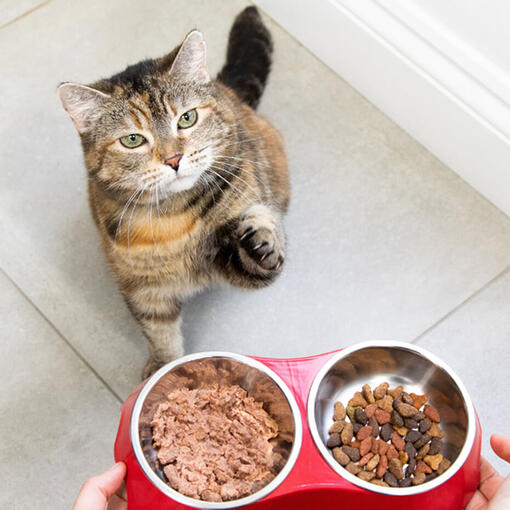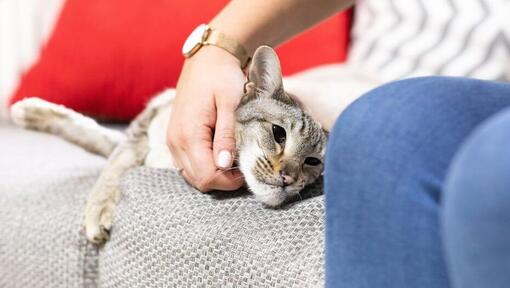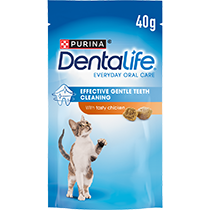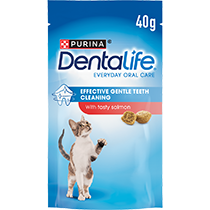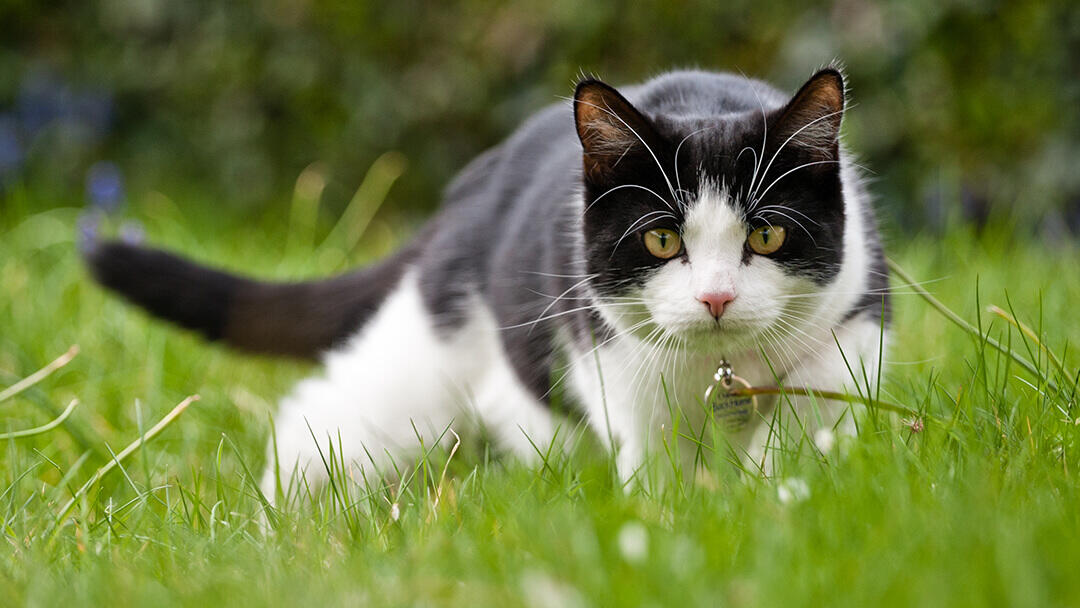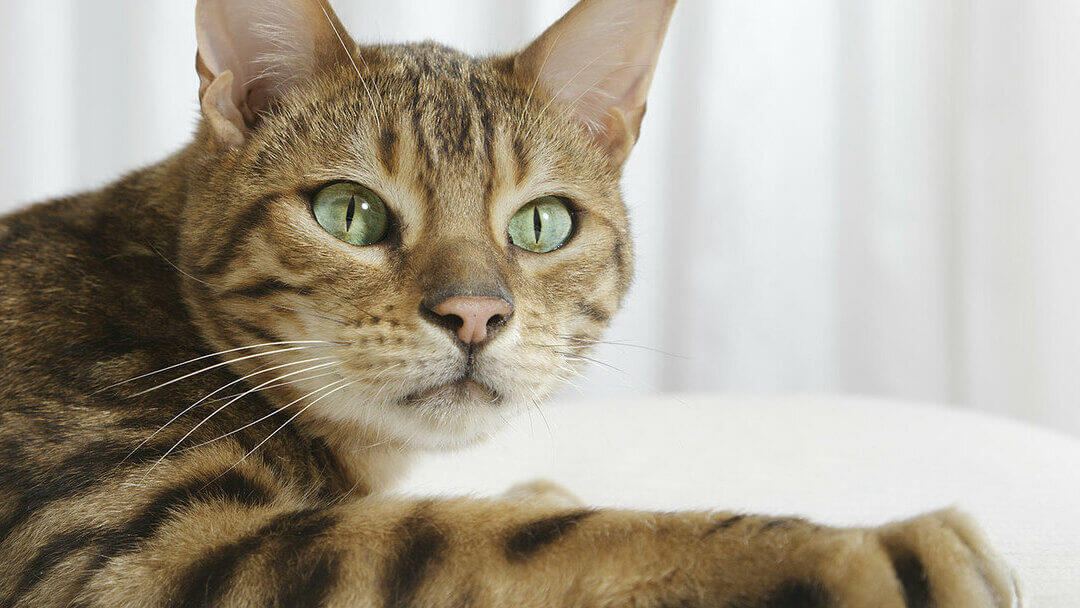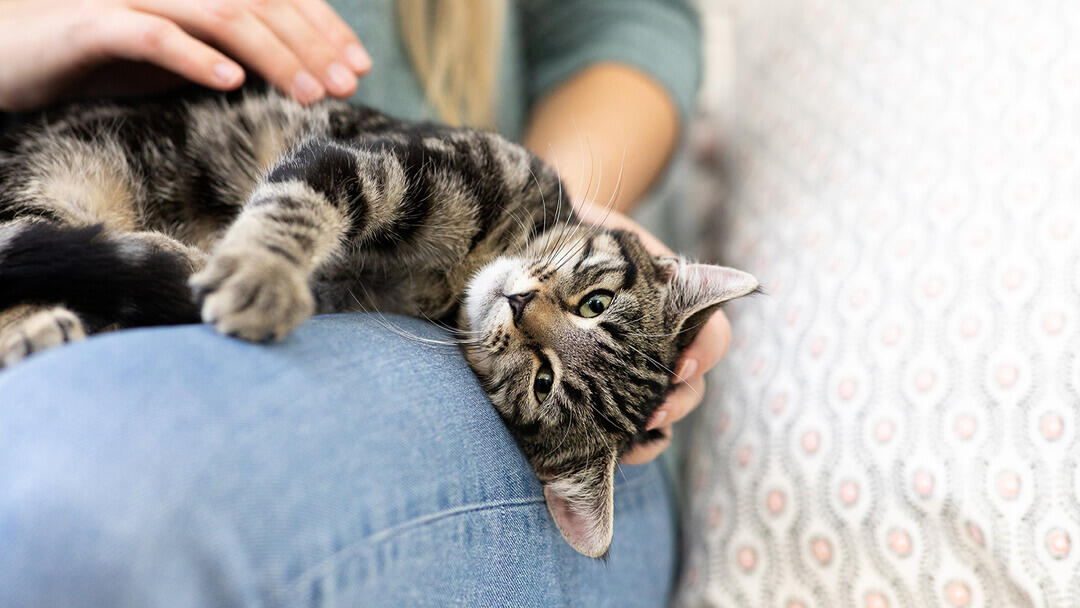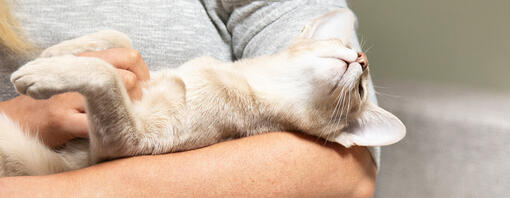
Curling up with your cat as she purrs is a comfort to all pet owners. It’s a sign they’re happy, content, and feeling settled on your lap, enjoying lots of fuss and attention – or is it?
Why do cats purr?
Cats often express their feelings by purring, in the same way that when we’re happy we smile and dogs wag their tails. Purring cats aren’t always happy cats though, and there’s lots of mystery around why they purr and how they make this sound.
In general, although cats can purr when they are alone, it is much more common for them to do so when they are with another cat or individual (especially humans, but they can also do it towards dogs or other animals if they are well-socialised). In other words, it is assumed that one of the functions is to communicate between different individuals.
Here are some possible reasons why your cat is purring:
Cats may purr when they’re happy, safe, and content. If you’re stroking your cat and they start to purr, it’s probably a sign that they’re happy! This is normally combined with relaxed body language like stretching out, to show that they feel safe. In other words, your cat is telling you “please, can you keep doing that?”.
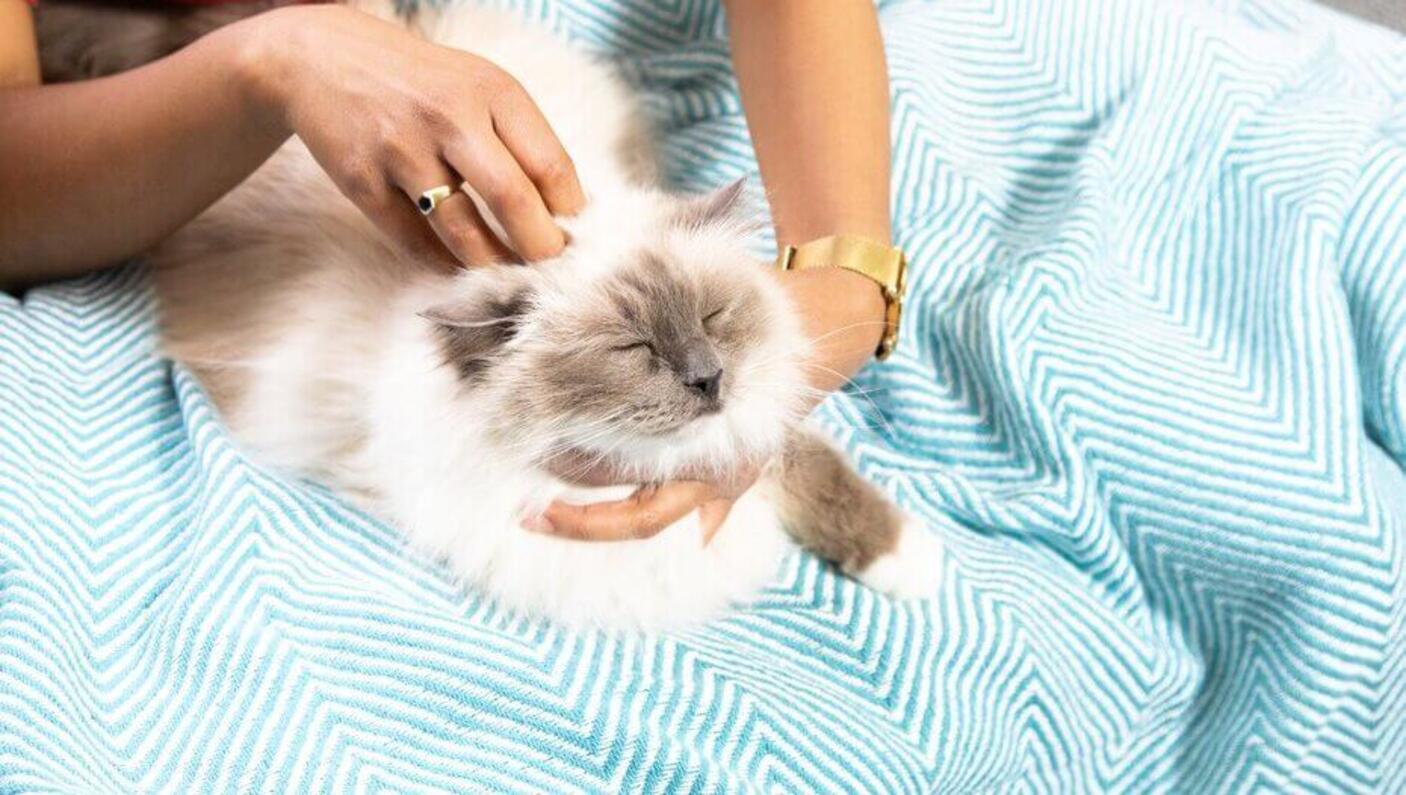
Previous scientific research has shown that cats don’t just purr when they’re happy, but also when they’re distressed or afraid. There is also a theory that purring is a defence mechanism, and a way for cats to keep calm in stressful situations, as the vibrations produced can help to keep cats relaxed. However, further research is needed to confirm if this hypothesis is correct. In this case, especially if they do it when another individual is nearby, it may mean that “they would like you to stay with them because they are scared”. Again, more research is needed to confirm this statement.
Purring isn’t just a method of non-verbal communication either; but may also be a way that cats self-sooth and manage pain. Mother cats will often purr during labour which may help to relieve discomfort and she will continue to purr after her kittens are born to lead them to her body for nursing.
Since kittens are born blind and deaf, the vibrations from their mother are crucial to their survival as their mother will purr to lead the kittens to her teats to feed. And at just two days old, the kittens can start communicating with their mum and littermates by purring back. For example, there has been speculation about the possibility that kittens purr so that the mother does not move during breastfeeding.
The power of purrsuasion! Have you ever heard your cat purring louder and more desperately when she’s hungry? Researchers have recently identified a new purr called the ‘solicitation purr,’ which alters the normal-sounding purr into a more urgent ‘cry-like’ sound. Additionally, this purring can be accompanied by a sound produced by the vocal cords (see below “how do cats purr?”). This frequency is similar to that of a crying baby, which makes us instinctively want to help, and in your hungry cat’s case makes us rush for the cat treats!
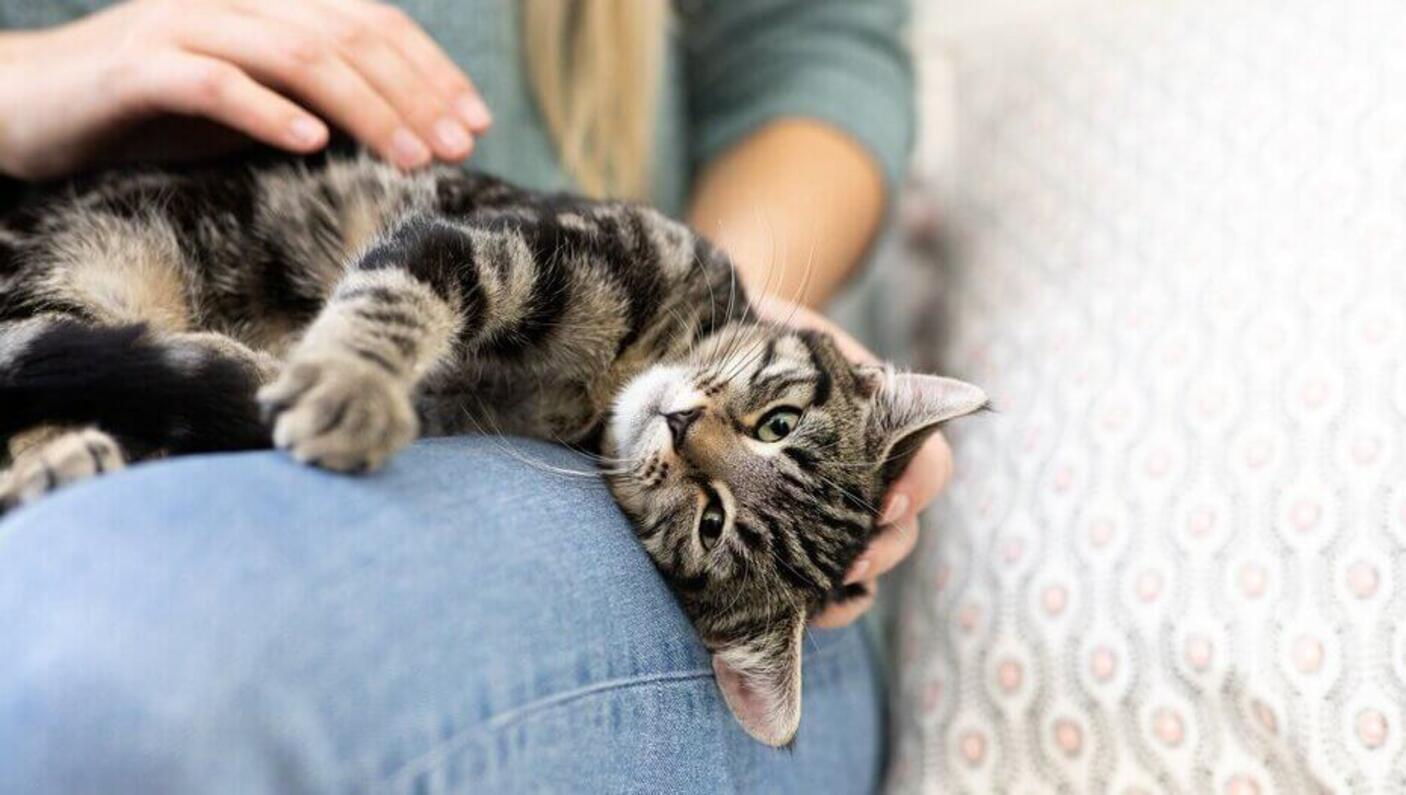
So, we know why cats purr, but how do they actually make such a fascinating sound?
How do cats purr?
We’re still not exactly sure of the process that creates purring in cats. Research suggests that muscles in your cat’s throat can vibrate the vocal cords - and as your cat breathes in and out, air hits the vibrating muscles, this is most likely to be what makes the cat purring sound.
Researchers are also not sure what causes this to happen or why cats purr. It seems that signals in your cat’s brain create the whole purring movement, so scientists think that the purr is more of a muscular twitch rather than a vocal communication like humans make with our voices.
How does cat purring help humans?
It’s a known fact that owning cats can help to relieve stress in humans, and this may not just be because they’re cute to look at and are soft to cuddle but it may also be because of the positive effects their purrs have on us.
One study shows that some cat owners have 40% less risk of a heart attack than non-cat owners and lower blood pressure after interacting with cats and hearing their soft purrs. Most interesting however, is what’s known as ‘healing by association.’ This is the theory that cats have the ability to calm, soothe, and help heal illnesses in people just by being nearby, and many people have said they can ease their migraines just by lying down with their purring cat next to them. However, further studies are needed to confirm this and it shouldn’t be used as a substitute for good medical care!
Why does my cat purr so loudly?
Some cats can purr louder than others and this is due to individual variations in anatomy or the level of stimulation. Some even purr more loudly as they get older; this is thought to be due to their muscles and vocal chords developing and getting stronger, so they get “better” at purring as they age. As purring can also be a way to self-soothe and cope with pain and stress, a cat may also increase their purring levels in response to this. If a cat’s purr changes significantly, it could indicate an underlying health issue, so it’s worth mentioning to your vet. If they are purring to get your attention or get you to feed them they may also purr loudly to make sure you hear them. In other words, cats can modify their purring through learning over time.
Why is my cat purring while sleeping?
Purring while sleeping will help many cats relax and feel content. If you noticed your cat doing it, don’t worry, it’s just a self-soothing mechanism and it may indicate that they’re experiencing nice dreams or they’re simply feeling comfortable and safe. It can also be a way of regulating their breathing and heart rate, which promotes a deeper and more restful sleep, and there is some research that suggests cats purr at a sound frequency that promotes bone and tissue healing, so they could be healing their bodies while they rest.
If this behaviour is abnormal for your cat or you’ve noticed other changes like increased sleeping, altered behaviour or changes in appetite and thirst, it could also indicate your cat is trying to self-soothe due to an underlying health issue, so it’s worth getting them checked by a vet.
When do kittens start purring?
Kittens will start purring as early as a few days old, usually while nursing or being close to their mother. The vibration from purring is the first form of communication between kittens and their mothers and littermates while they are still blind and deaf. As they grow up and gain more independence, they may continue purring while playing, exploring, or seeing comfort from their human friends.
Why do cats purr when you stroke them?
Cats will often purr when being stroke as a way to show contentment and pleasure. The act of being petted can stimulate the release of endorphins, making the cat feel happy and relaxed. It can also be a way of coping with discomfort so pay attention to their behaviour and if it seems like they don’t enjoy being petted, make sure to stop.
Why does my cat not purr?
It’s important to know that not all cats purr. Some may have physical or neurological issues making it difficult for them to purr or they may be more reserved and independent. Others simply prefer to communicate in other ways. There’s also the possibility that your cat may have never had the opportunity to learn how to purr. This happens when they’re separated from their mother at a young age or when they’re not socialised properly.
Interesting facts about cat purring
As mentioned earlier, there is a study that suggests that the low frequency of a cat purring causes a series of vibrations inside their body that may help to ease their breathing and heal injuries whilst acting as a form of pain relief.
Although, again, further research is required to confirm whether healing and purring are directly related and it’s important to remember that purring should never be relied on as a substitute for veterinary care.
Not all cats can purr and the soothing vibration is only found in domestic cats and some wild cats. Cats that purr can’t roar, and cats that roar can’t purr! This is because of the small bone found inside the vocal cords, which in roaring cats is a flexible ligament. This ligament can stretch which allows big cats to make a deep, roaring sound but in domestic cats, this ligament is replaced with a completely hardened bone that only allows air vibrations while exhaling and inhaling.
A purring cat can be happy, stressed, hungry, or content but by looking at their behaviour and sensing their mood, you’ll often be able to work out what they might be trying to communicate to you.
Next, find out what different cat sounds mean. Or if you’ve got a feline making hissing sounds all day long, here are reasons why cats hiss.


